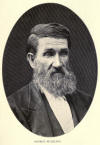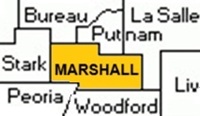
 On
the list of honored dead of Putnam county appears the name of
George SPARLING, who became a resident of this part of the state
when the work of civilization had scarcely been begun here. In
fact, he was among those who opened up this region, converting
it from a wild and uninhabited district to one of rich fertility
and aiding in the growth and progress that have wrought such a
wonderful transformation here in the last half century. He was
born in County Limerick, Ireland, November 29, 1819, his parents
being James and Mary (ATKINS) SPARLING. His forefathers in
Ireland were called Palatines, being German people who came from
Palatine on the Rhine. One hundred and ten families from Germany
started to seek homes in the new world, but were shipwrecked on
the coast of Ireland during the reign of Queen Anne, who gave
them homes at Pallas, County Limerick.
On
the list of honored dead of Putnam county appears the name of
George SPARLING, who became a resident of this part of the state
when the work of civilization had scarcely been begun here. In
fact, he was among those who opened up this region, converting
it from a wild and uninhabited district to one of rich fertility
and aiding in the growth and progress that have wrought such a
wonderful transformation here in the last half century. He was
born in County Limerick, Ireland, November 29, 1819, his parents
being James and Mary (ATKINS) SPARLING. His forefathers in
Ireland were called Palatines, being German people who came from
Palatine on the Rhine. One hundred and ten families from Germany
started to seek homes in the new world, but were shipwrecked on
the coast of Ireland during the reign of Queen Anne, who gave
them homes at Pallas, County Limerick.
The father of Mr. SPARLING died in 1821 and in 1832 his mother, sister and himself sailed for America, landing at Quebec in May of that year. Three weeks later his mother died of cholera, leaving the orphaned boy to battle for life in a strange land. He had but six sovereigns in his pocket. For a short time he lived with relatives in Canada, but as he grew older he learned the carpenter's trade and started out on his own account. He had the spirit of adventure, was self-reliant, given to industry and was determined to make his way in the world. Taking his chest of tools with him he went here and there, following the carpenter's trade at various places. He was employed on the construction of a hotel and a barn at Niagara Falls and thence followed the march of empire westward on to Chicago, which at that time was a small place. There he worked at his trade, assisting in building operations in that embryonic city. Money was very scarce and his employer offered him for several months labor a lot of forty acres in Chicago about where the city, hall now stands. His reply was "He couldn't see it," as the lots were only mud holes. Becoming acquainted with a Mr. HARRISON from Canada, he was prevailed upon to go to Dixon, Illinois, for Mr. HARRISON was greatly impressed with the country, exclaiming, "You can take a plow and turn over the wild prairie so that it looks like weather boarding on a large scale." Through the influence of Mr. HARRISON, Mr. SPARLING and other carpenters started on foot for Dixon, prevailing upon a farmer to haul their chests of tools, which were too heavy to be carried. They saw only four houses between Chicago and their destination. The hotel at Dixon was a log cabin which served also as a store and a small distillery and ferry were the attractions of the place. Mr. SPARLING secured a claim near there, built a log cabin and planted ten acres to corn the first year. In January, 1840, he came to Senachwine township, Putnam county, to assist John HARRISON in building several houses for which he had taken contracts. He aided Mr. HARRISON in building a log house upon the farm, which afterward became the property of Mr. SPARLING, who purchased it from Josiah HAYES. He also helped to build the Bradley store in Henry in the fall of 1841 the first frame building constructed in that place. Not having the money to pay Mr. SPARLING for his summer's labor the wage being two hundred dollars HARRISON sold to him the farm which became his future home, and he disposed of his claim near Dixon. In the summer of 1842 he broke prairie for his neighbors who had preceded him to this new country, these being J. E. TALIAFERRO, S. C. BACON, Phillip READ and James BUCHANAN. He also improved his own farm, turning the first furrows on the prairie and converting wild land into productive fields.
As a further preparation for having a home of his own Mr. SPARLING was married January 12, 1843, to Miss Adeline MORGAN, a daughter of Alanson and Melinda MORGAN, by whom he had eight children : George E., who is living in Senachwine township; James A., who died at the age of fourteen years; Mary M., who is the widow of V. H. WHEELER and resides upon a farm near Putnam ; Helen, the deceased wife of Fred WOOD; William Henry, who is living in Iowa; John S., who resides in Senachwine township ; and Albert and Adeline, twins. The former is now deceased, but the latter is the wife of John McKENZIE and lives in Henry. Mrs. SPARLING died April 13, 1857, when her youngest children were but eight months old. On the 8th of April, 1858, Mr. SPARLING was again married, his second union being with Sarah McCLUNG, a daughter of Harvey and Mary McCLUNG. The children of this marriage were: Martha Jane, Sarah, Eveline, Kate B., Samuel M., Frederick L. and Emory H. The mother died February 8, 1871, and for his third wife Mr. SPARLING chose Margaret McELROY, the widow of his cousin, James SPARLING, who still survives him and is now living in Henry. They became the parents of two children: Susan Mabel ATKINS and Homer Lewis. In 1844 Mr. and Mrs. SPARLING adopted a little daughter of Louis THOMPSON.
Mr. SPARLING's investment at Senachwine Lake was a fortunate one, as it proved to be one of the best fisheries in this part of the county. He began with spear and hook and found a ready market for all he could catch, customers coming as far as twenty miles. The lake was filled with fish. In the fall of 1843 Joseph GOODRICH took a seine to the lake and proposed to Mr. SPARLING that they should try using it. On the 3d of November they made a haul and caught twenty-five hundred pounds of fish, averaging ten pounds each. Mr. SPARLING then bought up the land about the lake, purchased a seine and found farming and fishing profitable. The lake proved the more remunerative, as he often caught one hundred and fifty barrels at a haul and the demand was as great as the supply. In a single season he used on an average of forty-five teams a day for three weeks to haul away the fish. He sold one haul for two hundred and twenty-three dollars and before the dam was built his income was about three thousand dollars a year from this source. He also carried on his farm work and brought his land under a high state of cultivation.
In 1857 Mr. SPARLING became identified with the Methodist Episcopal church of Putnam, of which he remained a consistent member and zealous worker until his death. He was a man of most generous and benevolent spirit and the poor and needy indeed found in him a friend. No one ever appealed to him for assistance in vain and no one was ever turned hungry away from his hospitable door. Mr. SPARLING was perhaps as widely known as any resident of Crow Meadows and no man of the community had more friends. He was generous to a fault and was most hospitable, giving with an open hand. In his home was extended a cordial welcome to all who chose to partake of its hospitality. He was a very generous contributor to the support of the Methodist Episcopal church at Putnam and to all of its various activities. He led a most useful life, performing each day's duties as they came to him, and he left behind a memory that is cherished by all who knew him because of his probity and his faithfulness. He was familiarly and lovingly called Uncle George by all who knew him. Such a name is only given as a token of the warmest esteem and friendship and such was the case with Mr. SPARLING. That he had prospered in his business life is indicated by the fact that he left an estate of about sixteen hundred acres of land, yet he never selfishly hoarded his means, but was most generous in his donations to many worthy causes and rendered assistance to the poor that is immeasurable, for it was done unostentatiously, frequently none knowing about it save the recipient.
Extracted July 2011 by Norma Hass from Past and Present of Marshall and Putnam Counties Illinois, 1907.
| Bureau Putnam La Salle | |||
| Stark |
 |
||
| Peoria | Woodford | ||

